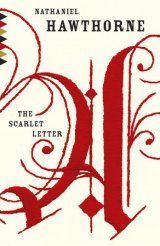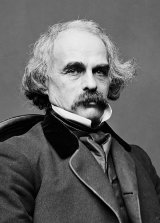The Scarlet Letter Page #5
First published in 1850, The Scarlet Letter is Nathaniel Hawthorne's masterpiece and one of the greatest American novels. Its themes of sin, guilt, and redemption, woven through a story of adultery in the early days of the Massachusetts Colony, are revealed with remarkable psychological penetration and understanding of the human heart.
I used to watch and study this patriarchal personage with, I think, livelier curiosity than any other form of humanity there presented to my notice. He was, in truth, a rare phenomenon; so perfect, in one point of view; so shallow, so delusive, so impalpable such an absolute nonentity, in every other. My conclusion was that he had no soul, no heart, no mind; nothing, as I have already said, but instincts; and yet, withal, so cunningly had the few materials of his character been put together that there was no painful perception of deficiency, but, on my part, an entire contentment with what I found in him. It might be difficult--and it was so--to conceive how he should exist hereafter, so earthly and sensuous did he seem; but surely his existence here, admitting that it was to terminate with his last breath, had been not unkindly given; with no higher moral responsibilities than the beasts of the field, but with a larger scope of enjoyment than theirs, and with all their blessed immunity from the dreariness and duskiness of age. One point in which he had vastly the advantage over his four-footed brethren was his ability to recollect the good dinners which it had made no small portion of the happiness of his life to eat. His gourmandism was a highly agreeable trait; and to hear him talk of roast meat was as appetizing as a pickle or an oyster. As he possessed no higher attribute, and neither sacrificed nor vitiated any spiritual endowment by devoting all his energies and ingenuities to subserve the delight and profit of his maw, it always pleased and satisfied me to hear him expatiate on fish, poultry, and butcher's meat, and the most eligible methods of preparing them for the table. His reminiscences of good cheer, however ancient the date of the actual banquet, seemed to bring the savour of pig or turkey under one's very nostrils. There were flavours on his palate that had lingered there not less than sixty or seventy years, and were still apparently as fresh as that of the mutton chop which he had just devoured for his breakfast. I have heard him smack his lips over dinners, every guest at which, except himself, had long been food for worms. It was marvellous to observe how the ghosts of bygone meals were continually rising up before him--not in anger or retribution, but as if grateful for his former appreciation, and seeking to reduplicate an endless series of enjoyment, at once shadowy and sensual: a tenderloin of beef, a hind-quarter of veal, a spare-rib of pork, a particular chicken, or a remarkably praiseworthy turkey, which had perhaps adorned his board in the days of the elder Adams, would be remembered; while all the subsequent experience of our race, and all the events that brightened or darkened his individual career, had gone over him with as little permanent effect as the passing breeze. The chief tragic event of the old man's life, so far as I could judge, was his mishap with a certain goose, which lived and died some twenty or forty years ago: a goose of most promising figure, but which, at table, proved so inveterately tough, that the carving-knife would make no impression on its carcase, and it could only be divided with an axe and handsaw. But it is time to quit this sketch; on which, however, I should be glad to dwell at considerably more length, because of all men whom I have ever known, this individual was fittest to be a Custom-House officer. Most persons, owing to causes which I may not have space to hint at, suffer moral detriment from this peculiar mode of life. The old Inspector was incapable of it; and, were he to continue in office to the end of time, would be just as good as he was then, and sit down to dinner with just as good an appetite. There is one likeness, without which my gallery of Custom-House portraits would be strangely incomplete, but which my comparatively few opportunities for observation enable me to sketch only in the merest outline. It is that of the Collector, our gallant old General, who, after his brilliant military service, subsequently to which he had ruled over a wild Western territory, had come hither, twenty years before, to spend the decline of his varied and honourable life. The brave soldier had already numbered, nearly or quite, his three-score years and ten, and was pursuing the remainder of his earthly march, burdened with infirmities which even the martial music of his own spirit-stirring recollections could do little towards lightening. The step was palsied now, that had been foremost in the charge. It was only with the assistance of a servant, and by leaning his hand heavily on the iron balustrade, that he could slowly and painfully ascend the Custom-House steps, and, with a toilsome progress across the floor, attain his customary chair beside the fireplace. There he used to sit, gazing with a somewhat dim serenity of aspect at the figures that came and went, amid the rustle of papers, the administering of oaths, the discussion of business, and the casual talk of the office; all which sounds and circumstances seemed but indistinctly to impress his senses, and hardly to make their way into his inner sphere of contemplation. His countenance, in this repose, was mild and kindly. If his notice was sought, an expression of courtesy and interest gleamed out upon his features, proving that there was light within him, and that it was only the outward medium of the intellectual lamp that obstructed the rays in their passage. The closer you penetrated to the substance of his mind, the sounder it appeared. When no longer called upon to speak or listen--either of which operations cost him an evident effort--his face would briefly subside into its former not uncheerful quietude. It was not painful to behold this look; for, though dim, it had not the imbecility of decaying age. The framework of his nature, originally strong and massive, was not yet crumpled into ruin.
Translation
Translate and read this book in other languages:
Select another language:
- - Select -
- 简体中文 (Chinese - Simplified)
- 繁體中文 (Chinese - Traditional)
- Español (Spanish)
- Esperanto (Esperanto)
- 日本語 (Japanese)
- Português (Portuguese)
- Deutsch (German)
- العربية (Arabic)
- Français (French)
- Русский (Russian)
- ಕನ್ನಡ (Kannada)
- 한국어 (Korean)
- עברית (Hebrew)
- Gaeilge (Irish)
- Українська (Ukrainian)
- اردو (Urdu)
- Magyar (Hungarian)
- मानक हिन्दी (Hindi)
- Indonesia (Indonesian)
- Italiano (Italian)
- தமிழ் (Tamil)
- Türkçe (Turkish)
- తెలుగు (Telugu)
- ภาษาไทย (Thai)
- Tiếng Việt (Vietnamese)
- Čeština (Czech)
- Polski (Polish)
- Bahasa Indonesia (Indonesian)
- Românește (Romanian)
- Nederlands (Dutch)
- Ελληνικά (Greek)
- Latinum (Latin)
- Svenska (Swedish)
- Dansk (Danish)
- Suomi (Finnish)
- فارسی (Persian)
- ייִדיש (Yiddish)
- հայերեն (Armenian)
- Norsk (Norwegian)
- English (English)
Citation
Use the citation below to add this book to your bibliography:
Style:MLAChicagoAPA
"The Scarlet Letter Books." Literature.com. STANDS4 LLC, 2024. Web. 23 Nov. 2024. <https://www.literature.com/book/the_scarlet_letter_160>.




Discuss this The Scarlet Letter book with the community:
Report Comment
We're doing our best to make sure our content is useful, accurate and safe.
If by any chance you spot an inappropriate comment while navigating through our website please use this form to let us know, and we'll take care of it shortly.
Attachment
You need to be logged in to favorite.
Log In